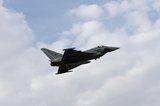Swiss ban aerospace firm Pilatus from operating in Saudi, UAE
On 26th June Switzerland banned aerospace firm Pilatus from further operating in Saudi Arabia and the United Arab Emirates after finding the Swiss company gave ‘logistical support’ to the armed forces of both countries.
The Swiss foreign ministry said in a statement that the conduct of Pilatus in Saudi Arabia and UAE was ‘incompatible with the federal government's foreign policy objectives,’ without specifying further.
The Saudi and UAE air forces have formed key parts of the Arab coalition that has bombed Iran-backed Huthi rebels in Yemen since 2015, a campaign that has partly triggered what the UN calls the world's worst humanitarian disaster.
The Saudi-led campaign suffered a blow last week when Britain temporarily suspended approving new arms export licenses to Riyadh that might be used in Yemen.
In 2017, Pilatus signed a five-year maintenance contract on a fleet of 55 jets it sold to the Saudi military, while the UAE has bought 25 jets from the company used to train pilots.
The company's work in the two countries amounts to ‘technical support, replacement parts management and rectifying faults affecting the Pilatus PC-21 aircraft,’ the foreign ministry said in a statement.
‘These services qualify as logistical support for armed forces’ and must be ‘discontinued,’ it added.
It gave the company 90 days to pull out of both countries.
Founded in 1939, Pilatus employs around 2,000 people in central Switzerland, with a focus on aircraft production and services.
More from Defence Notes
-
![Why small guns have been critical to layered CUAS architectures]()
Why small guns have been critical to layered CUAS architectures
Multiple countries have been deploying small arms as the last line of drone defence due to their multiple operational and tactical advantages.
-
![Singapore Airshow 2026: ST Engineering hints at export success for AME assault rifle family]()
Singapore Airshow 2026: ST Engineering hints at export success for AME assault rifle family
The Singapore-based technology company unveiled its new rifle family at this week’s airshow. Chen Chuanren spoke with the ST Engineering’s head of small arms to find out more about how the weapons have been refined.
-
![High tension in the High North – a wake-up call for NATO’s future Arctic defence efforts?]()
High tension in the High North – a wake-up call for NATO’s future Arctic defence efforts?
Any potential ‘Arctic Sentry’ mission would be months in the planning, but with tensions high in the region given the US’s push for Greenland, NATO countries will need to continue to emphasise their commitment to the region, analysts have said.
-
![Venezuela prepares personnel and equipment for a potential second US attack]()
Venezuela prepares personnel and equipment for a potential second US attack
Defence Minister Gen Vladimir Padrino López has declared that the Venezuelan armed forces “will continue to employ all its available capabilities for military defence”.
-
![As the new year starts, the UK defence spending delay continues]()
As the new year starts, the UK defence spending delay continues
The UK’s defence spending commitments remain uncertain as the government’s Defence Investment Plan, which had been due by the end of 2025, is yet to be published.
-
![How might European countries look to tackle drone incursions?]()
How might European countries look to tackle drone incursions?
Disruption of infrastructure in Europe, whether by cyberattack, physical damage to pipelines or uncrewed aerial vehicles flying over major airports, as has happened more recently, is on the rise. What is the most effective way of countering the aerial aspect of this not-so-open warfare?

























